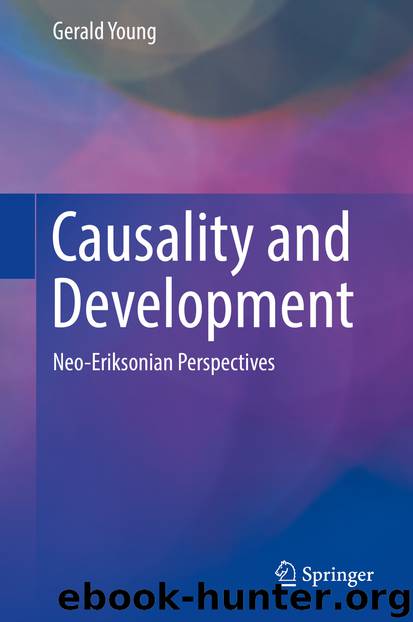Causality and Development by Gerald Young

Author:Gerald Young
Language: eng
Format: epub
ISBN: 9783030024932
Publisher: Springer International Publishing
Interim Summary
Before delving into the relationship between cognitive sub-stage in development and implications for corresponding socio-affective development, the manner in which I present the cognitive acquisitions of each sub-stage needs clarification. Keeping in mind that these sub-stages are Piagetian-based but have been updated into more contemporary language and include five sub-stages within each of the five stages, which is a much more complex model than Piaget’s original one, I should not resort to using Piaget’s concepts, such as concrete operations, as if they were existing cognitive structures within the child’s cognitive mapping that govern cognitive activity through their filter and deployment. Piaget did not consider these concepts in this way. That said, for me, they constitute short-hands to represent the panoply of cognitive schemes/operations/plans available at any one sub-stage in the present model and, therefore, often I refer to them as separate activatory entities in cognition.
Also note that, before beginning describing the first sub-stage in the present model, it is important to examine the concept of the cognitive (mis)perception of the other, which provides a metric for understanding the nature of the environmental support or its lack for the needs of the child/person. Each sub-stage in the current model indicates in this regard what would happen if the environment was unsupportive at the level of the sub-stage and what would happen if people were treated in the way indicated despite being more advanced cognitively than the sub-stage indicates socio-affectively. Therefore, the lower/earlier the (sub)stage involved in the (mis)perception, the worse the environmental support. As an example, if people are treated as if they were a bag of reflexes, at best, the environment would be abusive and even murderous.
The cognitive (mis)perception of the other changes accordingly to the stage in which it becomes an issue. If treated poorly when people are infants, the environment would be dominatory and repressive. If treated this way as children, the environment would be pacificatory and channeling, and so on.1
The following gives a more detailed view of the environment in terms of the cognitive (mis)perception of the other when the environment functions as if the person is a bag of reflexes, and nothing more, including in the early born. That is, if perceived as a reflexive entity, at best, with not even the right to live, the person will be exposed to an entirely abusive social environment to the point of torture (and, collectively, even genocide), and can feel obliterated as a result. The person would be subject to the worst abuse, even death (and without remorse of the perpetrator(s)). The impulse that would develop in the person subject to this obliterating regime would be not wanting to live. The child living this regime might not have the capacity to resist suicidal and self-injurious behavior. The cognitive and socio-emotional skills available to the developing person in this sub-stage are the most minimally reflexive, with no real self-development taking place. The person subject to this regime might have experienced it right from birth and have grown cognitively
Download
This site does not store any files on its server. We only index and link to content provided by other sites. Please contact the content providers to delete copyright contents if any and email us, we'll remove relevant links or contents immediately.
Rewire Your Anxious Brain by Catherine M. Pittman(18640)
Talking to Strangers by Malcolm Gladwell(13344)
The Art of Thinking Clearly by Rolf Dobelli(10446)
Mindhunter: Inside the FBI's Elite Serial Crime Unit by John E. Douglas & Mark Olshaker(9313)
Becoming Supernatural by Dr. Joe Dispenza(8197)
Change Your Questions, Change Your Life by Marilee Adams(7755)
Nudge - Improving Decisions about Health, Wealth, and Happiness by Thaler Sunstein(7689)
The Road Less Traveled by M. Scott Peck(7592)
The Lost Art of Listening by Michael P. Nichols(7487)
Mastermind: How to Think Like Sherlock Holmes by Maria Konnikova(7315)
Enlightenment Now: The Case for Reason, Science, Humanism, and Progress by Steven Pinker(7305)
Win Bigly by Scott Adams(7183)
The Way of Zen by Alan W. Watts(6595)
Daring Greatly by Brene Brown(6501)
Big Magic: Creative Living Beyond Fear by Elizabeth Gilbert(5753)
Grit by Angela Duckworth(5601)
Ego Is the Enemy by Ryan Holiday(5412)
Men In Love by Nancy Friday(5232)
The Laws of Human Nature by Robert Greene(5170)
